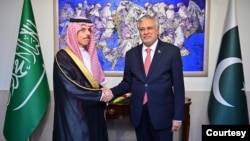Saudi Arabia and Pakistan jointly called for a cease-fire in Gaza on Tuesday, with Saudis urging de-escalation in the region without mentioning Iran’s recent strike on Israel.
Saudi Foreign Minister Faisal bin Farhan Al-Saud led a high-level delegation to Islamabad Monday on a two-day visit to explore investment opportunities in Pakistan.
Addressing a joint press conference with Pakistani counterpart Ishaq Dar at the end of the short visit, Al-Saud urged a cessation of hostilities in Gaza between Israel and militant group Hamas, citing the mounting death toll of Palestinians.
“The situation is unacceptable. This is a complete failure of the international system. We must have a cease-fire now,” Al-Saud said.
“The reality is the international community is not living up to its responsibility. We must do more to end the killing,” the Saudi foreign minister added.
According to the Hamas-run health ministry in Gaza, since October 7 of last year, Israeli military operations aimed at eliminating Hamas have killed more than 33,000 Palestinians. The war broke out after Hamas attacked Israel, killing nearly 1,200 civilians and taking around 250 hostages.
Pakistan’s foreign minister said he had discussed the war in Gaza with the visiting foreign minister.
“We both agree that what we need is immediate and unconditional cease-fire to take place,” Dar said.
Without naming Israel, Pakistan’s foreign minister declared the situation in Gaza a genocide and called for accountability.
Both the top diplomats urged unhindered delivery of aid to Palestinians.
According to ReliefWeb, a platform run by United Nations Office for the Coordination of Humanitarian Affairs, six months into the war, 90 percent of Gazans are displaced with more than half-a-million on the verge of famine.
Neither official called for the release of the more than 100 Israeli hostages still in Hamas custody.
Silent on Iran
Addressing the regional fallout of the Gaza war, Riyadh’s top diplomat called for de-escalation, but refrained from calling out Iran for launching a massive drone and missile attack against Israel over the weekend.
“Look, we are already in an unstable region. The humanitarian catastrophe in Gaza is already inflaming the region. We do not need more conflict in our region,” Al-Saud said.
Long-time rivals Riyadh and Tehran restored diplomatic ties last year. The deal brokered by China ended a seven-year rift between the two Muslim countries.
“So, it is our position that de-escalation must be everyone’s priority. When there are differences, they should be resolved through dialogue, not through the use of force,” Al-Saud added.
The Iranian attack involving some 350 drones and missiles came in response to Israel’s alleged strike on Iran’s consulate in Syria on April 1. The strike killed two Iranian generals and five other officers of its Islamic Revolutionary Guard Corps, according to Tehran.
The Pakistani foreign minister also did not address Iran's attack on Israel.
He called, however, for the creation of a Palestinian state with pre-1967 borders, reiterating Pakistan’s diplomatic position on the Israel-Palestinian conflict.
“It is good for Israel, perhaps, also,” Dar said, mentioning the Jewish state only once in his remarks.
No investment deal
Pakistan presented a wide range of investment options to the visiting Saudi delegation, however, no deals were inked during the visit.
The delegation included Saudi ministers for water and agriculture, and industry and mineral resources, as well as the assistant minister for investment and senior officials from the Saudi Public Investment Fund, among others.
The Saudi visit follows one by a Pakistani delegation to Saudi Arabia earlier this month. During that visit, led by Pakistani Prime Minister Shehbaz Sharif, both sides agreed to expedite “the first wave of investment package worth $5 billion which was discussed previously,” according to a Pakistani foreign ministry statement.
Pakistani state media recently reported Riyadh could invest $1 billion in Reko Diq — a copper and gold mine project — in the restive Balochistan province. The two sides, however, did not report any progress on that during Tuesday’s media briefing.
Al-Saud, whose team met with Pakistan’s president, prime minister and the powerful army chief, sounded optimistic about future investment in the cash-strapped South Asian country, saying his delegation was “impressed” with the presentations it received.
Critics, however, say Pakistan has boasted of billion-dollar pledges from Saudi Arabia in the past as well with little to show for it.





